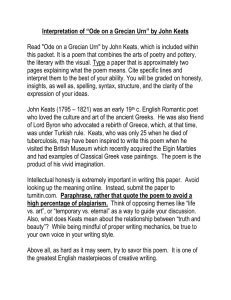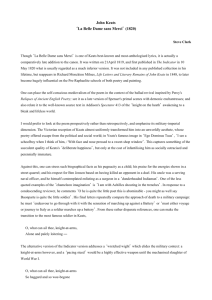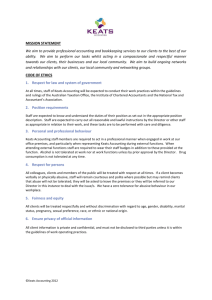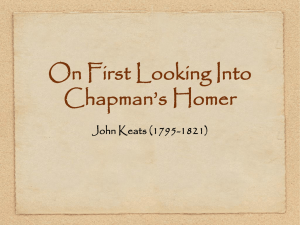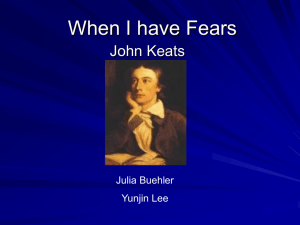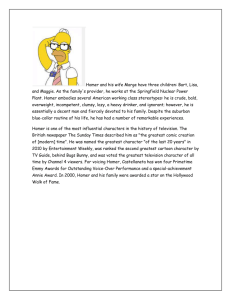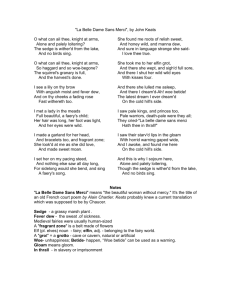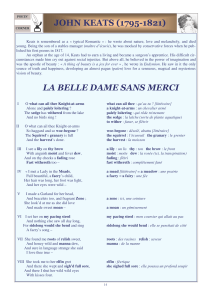Keats, On First Looking Into Chapman's Homer AND
advertisement
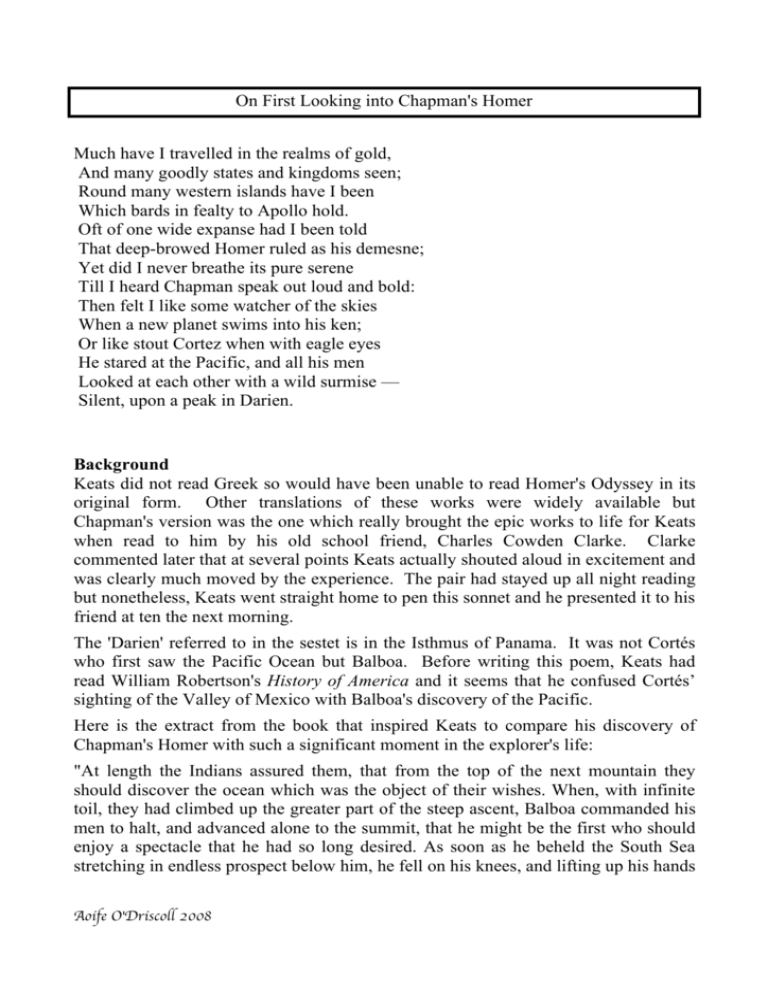
On First Looking into Chapman's Homer Much have I travelled in the realms of gold, And many goodly states and kingdoms seen; Round many western islands have I been Which bards in fealty to Apollo hold. Oft of one wide expanse had I been told That deep-browed Homer ruled as his demesne; Yet did I never breathe its pure serene Till I heard Chapman speak out loud and bold: Then felt I like some watcher of the skies When a new planet swims into his ken; Or like stout Cortez when with eagle eyes He stared at the Pacific, and all his men Looked at each other with a wild surmise — Silent, upon a peak in Darien. Background Keats did not read Greek so would have been unable to read Homer's Odyssey in its original form. Other translations of these works were widely available but Chapman's version was the one which really brought the epic works to life for Keats when read to him by his old school friend, Charles Cowden Clarke. Clarke commented later that at several points Keats actually shouted aloud in excitement and was clearly much moved by the experience. The pair had stayed up all night reading but nonetheless, Keats went straight home to pen this sonnet and he presented it to his friend at ten the next morning. The 'Darien' referred to in the sestet is in the Isthmus of Panama. It was not Cortés who first saw the Pacific Ocean but Balboa. Before writing this poem, Keats had read William Robertson's History of America and it seems that he confused Cortés’ sighting of the Valley of Mexico with Balboa's discovery of the Pacific. Here is the extract from the book that inspired Keats to compare his discovery of Chapman's Homer with such a significant moment in the explorer's life: "At length the Indians assured them, that from the top of the next mountain they should discover the ocean which was the object of their wishes. When, with infinite toil, they had climbed up the greater part of the steep ascent, Balboa commanded his men to halt, and advanced alone to the summit, that he might be the first who should enjoy a spectacle that he had so long desired. As soon as he beheld the South Sea stretching in endless prospect below him, he fell on his knees, and lifting up his hands Aoife O'Driscoll 2008 to Heaven, returned thanks to God, who had conducted him to a discovery so beneficial to his country, and so honourable to himself. His followers, observing his transports of joy, rushed forward to join in his wonder, exultation, and gratitude" (Vol. III). John Keats simply remembered the image, rather than the actual historical facts. Clarke noticed the error and pointed it out to Keats but Keats decided not to correct it, possibly because the rhythm of the poem would have been upset by the extra syllable in the name 'Balboa'. Note the words 'wonder', 'exultation' and 'gratitude'. Keats chose this image of the explorer because that is how he felt on first reading Chapman's Homer. Summary In the first eight lines (octet), Keats tells us about his travel through the world of literature. He compares his reading of various works to voyages of discovery. There is a strong link between the world of the imagination, the world of poetry and the ancient Greek world as described by Homer. Much have I travelled in the realms of gold I have read many works of literature and valued them greatly And many goodly states and kingdoms seen: I have enjoyed reading these epic poems Round many western islands have I been I have read poems about the Greek islands Which bards in fealty to Apollo hold Which are sacred to Apollo, the God of poetry and music Oft of one wide expanse had I been told I had often heard of one particular epic work That deep-browed Homer ruled as his demense That Homer, the intellectual, wrote Yet did I never breathe its pure serene But I never read it, I never metaphorically breathed the clean fresh air of Homer's world, Till I heard Chapman speak out loud and bold Aoife O'Driscoll 2008 Until I heard Chapman's marvellous, stirring translation read aloud for the first time. (Note the change here from a description of his experience of literature in general to his feelings on hearing Chapman's Homer. The change is signalled by the use of the word 'Then' at the start of the sestet.) Then I felt like some watcher of the skies Then I felt like an astronomer When a new planet swims into his ken; When he discovers a new planet Or like stout Cortez when with eagle eyes Or like Cortez when he gazed keenly He stared at the Pacific, and all his men Looked at each other with a wild surmiseHe saw the Pacific for the first time and all his men, amazed and astonished at the expression on his face, guessed that he had discovered something monumental Silent upon a peak in Darien Awed and silent on a hill in Panama. In the sestet, Keats tells us how he felt when he 'discovered' Chapman's Homer. He draws an analogy between his excitement on discovering Chapman's Homer and the excitement felt by an explorer seeing a new land for the first time or an astronomer who realises he has found a new planet. It is worth noting that the astronomer worked alone but the explorer travelled with companions. Keats believed he was joining a group of people who had already read Homer's work. Aoife O'Driscoll 2008 Theme The theme of this poem is the poet's great love of poetry and the excitement of reading new literature which is like being an explorer discovering new oceans or an astronomer discovering a new planet. Imagery In the octet, Keats uses a metaphor to compare literature, and poetry in particular, to travel. In the sestet he uses two similes, that of the astronomer and the explorer to explain how he felt on hearing Chapman's translation for the first time. Structure This poem is a Petrarchan sonnet, divided into an octet and a sestet. The first eight lines introduce the idea of the poem and the final six tell us Keats' personal reaction to Chapman's Homer. This change of thought is called a volta and it is a typical feature of Italian poetry. Keats uses it effectively to move from the idea of the poet as an explorer in the world of literature to his feelings on discovering Chapman's Homer. Tone There is a real sense of the poet's awe and excitement on reading Chapman's Homer. This is effectively conveyed by the comparisons with the discovery of a new planet and the discovery of a new ocean. Aoife O'Driscoll 2008 La Belle Dame Sans Merci Ah, what can ail thee, knight-at-arms, Alone and palely loitering? The sedge has withered from the lake, And no birds sing. Ah, what can ail thee, knight-at-arms, So haggard and so woe-begone? The squirrel's granary is full, And the harvest's done. I see a lily on thy brow With anguish moist and fever-dew, And on thy cheek a fading rose Fast withereth too. I met a lady in the meads, Full beautiful - a faery's child: Her hair was long, her foot was light, And her eyes were wild. I made a garland for her head, And bracelets too, and fragrant zone; She looked at me as she did love, And made sweet moan. I set her on my pacing steed, And nothing else saw all day long; For sideways would she bend, and sing A faery's song She found me roots of relish sweet, And honey wild, and manna dew, And sure in language strange she said, "I love thee true!" She took me to her elfin grot, And there she gazed and sighed full sore, Aoife O'Driscoll 2008 And there I shut her wild, wild eyes With kisses four. And there she lulled me to sleep And there I dreamed - Ah! woe betide The latest dream I ever dreamt On the cold hill side. I saw pale kings, and princes too, Pale warriors, death-pale were they all; Who cried -"La belle Dame sans Merci Hath thee in thrall!" I saw their starved lips in the gloam, With horrid warning gaped wide, And I awoke and found me here, On the cold hill side. And that is why I sojourn here, Alone and palely loitering, Though the sedge is withered from the lake, And no birds sing. Background In 1424, Alain Chartier, the French court poet, wrote a poem with this title. The title appealed to Keats so he used it himself but borrowed nothing else from the original. This poem may have been written in response to a dream Keats had about meeting a beautiful woman who was surrounded by ghostly lovers. Aoife O'Driscoll 2008 Narrator: Ah, what can ail thee, knight-at-arms, Alone and palely loitering? The sedge has withered from the lake, And no birds sing. What is wrong with you, brave knight, Alone and pale and wandering without purpose? The plants by the lake have died, And the birds are not singing. Note: The imagery of nature here is gloomy and depressing. The only plants mentioned are dead and there is no birdsong. It is obviously autumn but it is not a positive image of that season. Ah, what can ail thee, knight-at-arms, So haggard and so woe-begone? The squirrel's granary is full, And the harvest's done. What is wrong with you, brave knight, So careworn and so sad, The squirrel has stored his food for the winter And the farmers have gathered their harvest. Note: Although the knight is in a sorry state, not everyone or everything is similarly afflicted. Even though it is autumn, others are content and prepared for the winter ahead. Why isn't he? I see a lily on thy brow With anguish moist and fever-dew, And on thy cheek a fading rose Fast withereth too. I see you are sick; your forehead is as pale as a lily And you are feverish The colour is draining from your cheeks Very quickly. Note: The images of nature here are negative too; flowers are usually associated with love but here they signal sickness and death. Aoife O'Driscoll 2008 Knight: I met a lady in the meads, Full beautiful - a faery's child: Her hair was long, her foot was light, And her eyes were wild. I met a lady in the meadows She was so beautiful, like a fairy She had long hair and a graceful step Her eyes were wild. Note: Though the description of the lady is of a beautiful creature, there are hints of trouble to come. She may not be completely human and she has wild eyes. I made a garland for her head, And bracelets too, and fragrant zone; She looked at me as she did love, And made sweet moan. I made her a hair band of flowers And floral bracelets and a floral belt She looked at me as if she loved me And moaned softly Note: Although the images of nature, the references to flowers, are more traditional here, it is significant that the lady only looked at him as if she loved him. Is the knight perhaps reading too much into it? And why does she moan? This leads us to wonder if she is unhappy. I set her on my pacing steed, And nothing else saw all day long; For sideways would she bend, and sing A faery's song. I put her up on her prancing horse And gazed at her in adoration all day She bent down from the horse to sing to me A fairy's song. Note: In mediaeval stories, the knight would be the one on the prancing horse, here the situation is reversed. Does this tell us the lady is in charge? That she is the one Aoife O'Driscoll 2008 with the power? It is worth noting too that she seems to be choosing what they do, all the verses now start with 'She'. The lady is leading the knight, not the other way around. Still, there is no implication that she is deliberately leading him astray. She found me roots of relish sweet, And honey wild, and manna dew, And sure in language strange she said, "I love thee true!" She fed me wild fruits and honey and dew and in her strange language, her fairy voice, she told me she loved me. Note: Again, there are positive images of nature but there is an underlying note of darkness in the lady's 'strange' language. She is haunting and beautiful, certainly, but does her otherworldliness create too much of a gap between her and the knight? Do we sense they will be happy together? Of course, we know they won't be as we have been told at the beginning of the poem that he is wandering around alone, lost and miserable. She took me to her elfin grot, And there she wept and sighed full sore And there I shut her wild wild eyes With kisses four. She took me to her fairy cave And there she cried sadly And I soothed her and kissed her wild eyes With four kisses (two for each eye). Note: Again, the lady is leading the knight. Now the action has moved to a fairy cave, a place which we imagine to be cold and dark. This imagery foreshadows the unhappiness that the love affair will cause the knight. And there she lulled me to sleep, And there I dreamed, ah! woe betide, The latest dream I ever dreamt On the cold hill side. And there she soothed me to sleep And I dreamt- Oh dreadful memory! The last dream I ever dreamt Aoife O'Driscoll 2008 On the cold hill side Note: Now we are nearing the answer, what is it that has distressed the knight so much? He is clearly horrified at the memory and has been haunted by it since. Indeed, he has not slept since. Has he been afraid of a repeat of the dream? I saw pale kings, and princes too, Pale warriors, death-pale were they all; Who cried -"La belle Dame sans Merci Hath thee in thrall!" I saw many ghostly figures of kings and princes They were horribly pale, clearly dead. They cried that the beautiful lady without mercy had put me under a spell, I was her slave, bound to her by love. Note: Now the true horror of the knight's story begins to emerge. He is not the first to fall victim to the lady, she has led others to their fate also. Still, we don't know if she did this deliberately or if it was an unavoidable consequence of mortals and immortals falling in love. I saw their starved lips in the gloam. With horrid warning gaped wide, And I awoke, and found me here, On the cold hill's side. I saw their pale, starved lips in the twilight Their mouths gaped wide in a horrifying warning And I woke up and found myself On the cold hill side Note: The ghosts are starved, perhaps of love? Or of life? The knight wakes and finds himself alone on the cold hill side. The hill is 'cold', again an image of death or a reflection of the lady's love. And that is why I sojourn here Alone and palely loitering, Though the sedge is withered from the lake, And no birds sing. And that is why I stay here Alone and pale and wandering without purpose Although the plants by the lake have died Aoife O'Driscoll 2008 And the birds are not singing. Note: The poem has come in a full circle, the words in the last stanza are almost identical to those in the first. This may reflect the endless wandering of the night, the circular nature of the ballad is an echo of the loop in which the knight finds himself, doomed to wander the hill endlessly and possibly to join the legions of the ghostly kings and princes who found themselves in the same predicament. Their warning came too late, it could not save him. Theme The theme of this poem is how difficult it is to find true love in the real world. The knight believes for a while that he has found it but it is not real, it is not of this world. Imagery The imagery in this poem is interesting. Traditional images; flowers, fairies, knights, beautiful ladies, meadows and garlands of flowers are turned into images, not of love, but of death and sadness. The references to the cold hillside, the fairy cave, the dead plants and the silence of the birds give us a sense that all is not well. They are sad, gloomy images. Structure This is a ballad. (See key literary terms.) Note also the use of incremental repetition, a feature of English and Scottish ballads; the first and second stanzas begin in the same way but the end of the second stanza is different. This reinforces the ideas raised in the first stanza and adds to the musical quality of the poem. Tone The tone is gloomy and sad, full of references to death. There is no note of hope in the poem - instead, the hopelessness of ideal, courtly love is highlighted. Aoife O'Driscoll 2008
